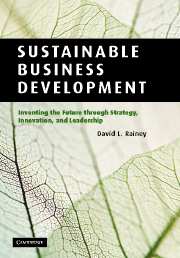Book contents
- Frontmatter
- Contents
- List of figures
- List of tables
- List of boxes
- List of abbreviations
- Acknowledgments
- Introduction
- Part I Enterprise thinking, the driving forces of change, and leadership
- Part II Innovation management, life cycle considerations, and insights
- 7 Sustainable technology management and development
- 8 Crafting and implementing sustainable business development programs
- 9 Life cycle thinking and framework
- 10 Formulation of life cycle assessment: initiation and inventory assessment
- 11 Implementation of life cycle assessment: impact and improvement assessments
- 12 Inventing the future through enterprise thinking and sustainable business development
- Glossary
- Select bibliography
- Index
- References
9 - Life cycle thinking and framework
from Part II - Innovation management, life cycle considerations, and insights
Published online by Cambridge University Press: 04 December 2009
- Frontmatter
- Contents
- List of figures
- List of tables
- List of boxes
- List of abbreviations
- Acknowledgments
- Introduction
- Part I Enterprise thinking, the driving forces of change, and leadership
- Part II Innovation management, life cycle considerations, and insights
- 7 Sustainable technology management and development
- 8 Crafting and implementing sustainable business development programs
- 9 Life cycle thinking and framework
- 10 Formulation of life cycle assessment: initiation and inventory assessment
- 11 Implementation of life cycle assessment: impact and improvement assessments
- 12 Inventing the future through enterprise thinking and sustainable business development
- Glossary
- Select bibliography
- Index
- References
Summary
Introduction
LCT is an intellectual methodology for examining, assessing, and improving technologies, products, and processes. It includes “cradle-to-grave” evaluation – i.e. evaluation of the upstream supply network management and manufacturing, the downstream aspects of product sale, use, and EoL considerations, and all of the entities related to any of these processes. LCT may be viewed as a subset of enterprise thinking, or a more specific form of it, depending on the management's perspective. LCT generally focuses on operational considerations while enterprise thinking focuses on strategic management considerations. LCT takes an integrative perspective on the linkages and relationships within the entire enterprise, in order to find new and improved ways to select and deploy inputs and processes that will create better outputs. It also looks at the business environment and its opportunities and challenges as a whole. Nothing is considered in isolation.
LCT involves a revolutionary philosophy about how to progress from achieving satisfactory results and continuous improvement to leading change, making significant improvements, and eliminating the causes of social, economic, environmental, and business problems. Rather than just focusing on maximizing growth and profits, LCT is aimed at finding opportunities to improve and achieve sustainable outcomes. The goal is to create value streams and networks that are strategically aligned and functioning effectively over time so that negative consequences are minimized and positive benefits and implications endure, justifying the investments of time, money, and resources.
- Type
- Chapter
- Information
- Sustainable Business DevelopmentInventing the Future Through Strategy, Innovation, and Leadership, pp. 507 - 551Publisher: Cambridge University PressPrint publication year: 2006



